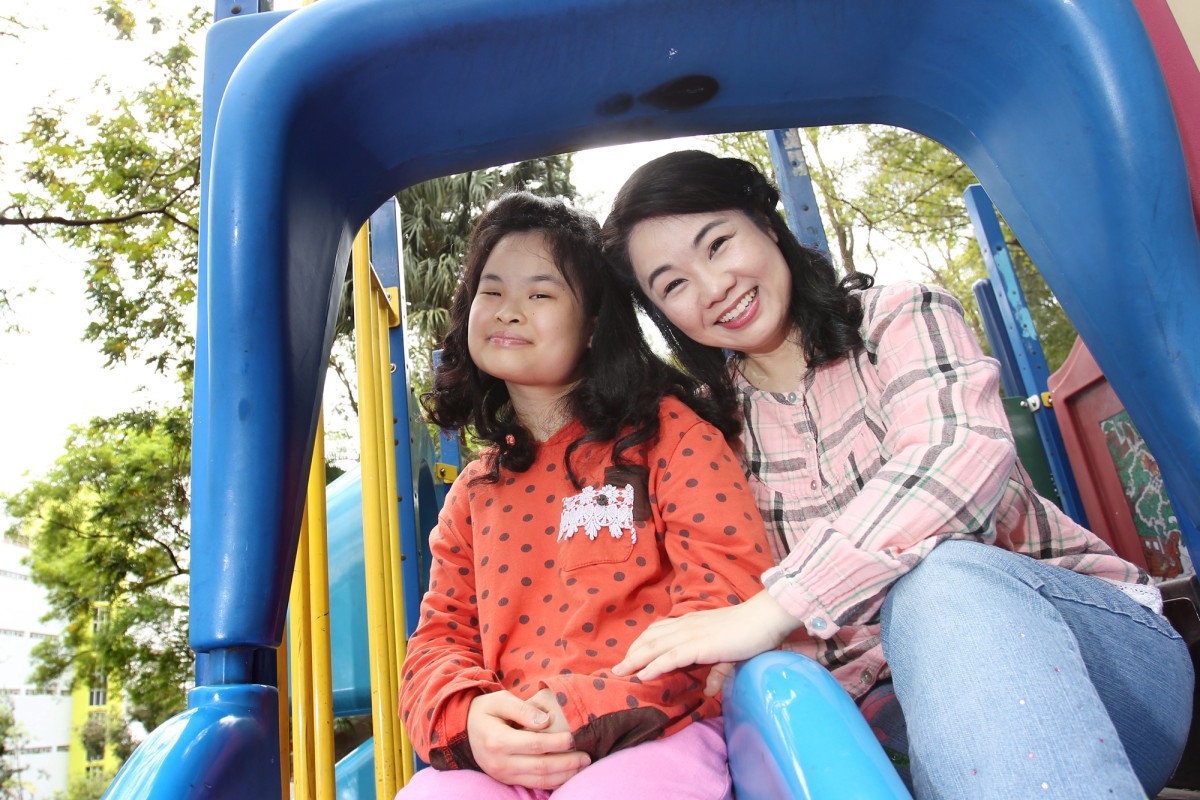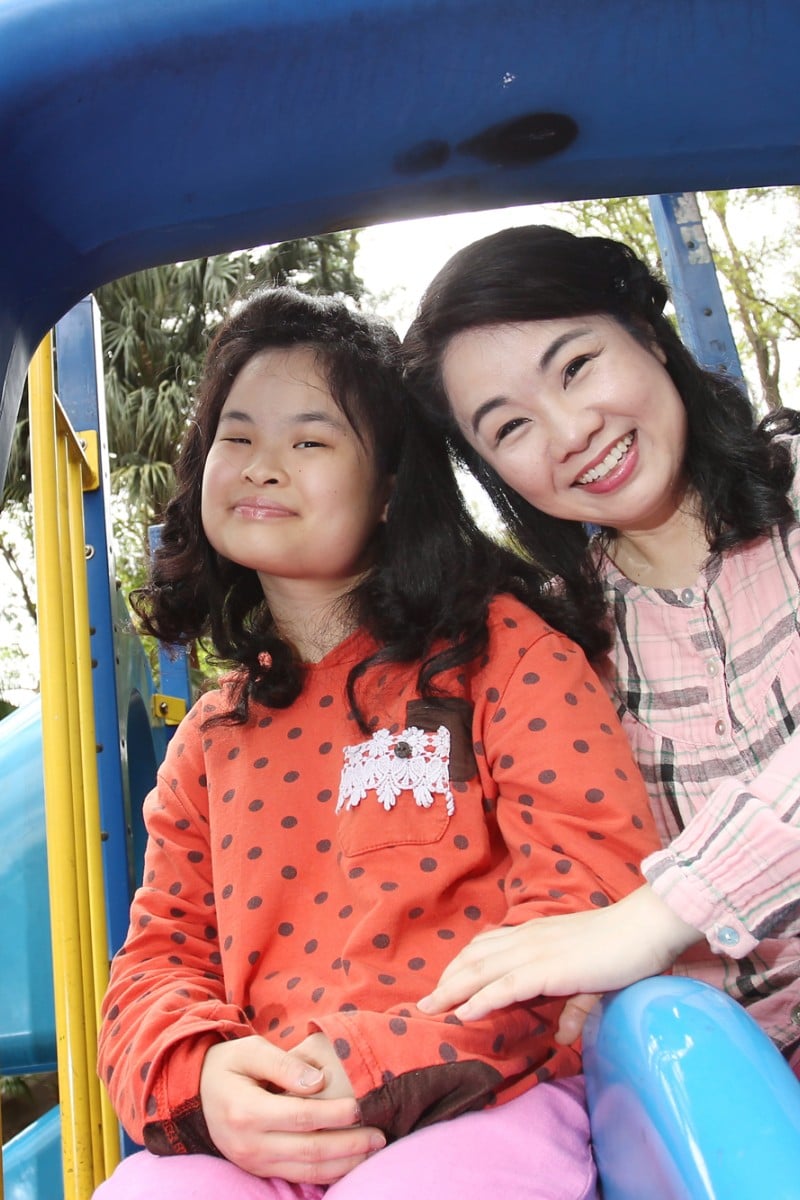 Queenie Lau (left) with her mother Maggie Cheng.
Queenie Lau (left) with her mother Maggie Cheng.With a beaming smile, Queenie Lau Pui-kiu looks like a normal 18 year old, if a little young for her age. But in fact, she is one of the 9,700 teenagers in Hong Kong with Autism Spectrum Disorder, as estimated by Heep Hong Society, a charity that serves children with special educational needs.
Education psychologist Galen Liu says autistic children have problems with communication. They stick to the same behaviours to feel secure. Some also have slow motor development. This means their body coordination might not be as well developed. They might also react differently to certain things that they see, hear, taste, smell or feel. Of the people who have ASD, roughly 70 per cent are mentally challenged. The remaining 30 per cent are considered “high-functioning”, which means they can handle mainstream schooling given suitable support.
Queenie was formally diagnosed when she was six, but started receiving physical therapy, occupational therapy and speech therapy at Heep Hong Society when she was two and a half. Early on, she was found to be gifted in languages and was fluent in Cantonese, English and Putonghua before she was three. Even though she is on the “high-functioning” end of the autism spectrum, Queenie had a hard time growing up.
“She seems to have a lot of potential, but it’s hard to draw the line between genius and stupidity. She can speak the languages just fine, but give her a reading comprehension exercise and she can come back with zero marks,” says her mother Maggie Cheng May-yuk.
“Yeah, I never get the slangs,” chips in Queenie, who is outspoken and has won awards in verse-speaking. Chatting is harder for her. “Sometimes I ask my friends and they explain the meaning to me.”
Queenie studies at mainstream school, but not everyone is understanding. “Oh, I have lots of wonderful bullying stories,” she says sarcastically. Her classmates have taped her hair to the chair, put thumbtacks in her shoes, and locked the door during recess so she couldn’t go to the bathroom and ended up wetting herself. They have even put other people’s belongings into her schoolbag and framed her for stealing.
But Cheng never complains to the school, even going so far as to remind teachers not to punish the bullies. “They will only get back at Queenie by stepping up their bullying,” she explains. “We just find ways to protect ourselves and dissolve the conflict.” At home, she conducts role play sessions with Queenie to help her deal with similar situations. Years after Queenie left a school because she couldn’t move onto its IB curriculum, she and Cheng were invited back for a sharing session at her classmates’ graduation night. As they were about to leave, one of the bullies approached them and asked sincerely if they could have a photo together – his way of apologising. Cheng tears up at the memory. “We suffered quietly for 10 years, but finally we saw this boy grow,” she says.
Bullies aside, the education system hasn’t been kind to Queenie either. Queenie can study, but she didn’t do well in exams because she found it difficult to focus. Poor motor skills also meant she couldn’t write quickly. After Queenie took the IGCSE and failed to qualify for IB, Cheng wanted to put her in a private international school. She said on two occasions, school principals were impressed by Queenie during the interviews, but broke their promise to enrol her after finding out that she was autistic. “They think people with autism spectrum disorder have emotional problems and will suddenly scream or something,” says Cheng.
Without a choice, Queenie entered Form Four of the NSS system. She had trouble dealing with subjects such as liberal studies and Chinese language, which demanded critical and analytical skills. “I saw a news video clip of students taking exams in a hall. Their hands were like motors, writing page after page. I can’t do that,” says Queenie. She was under so much stress that she experienced severe chest pains, and once had to be hospitalised for two days. During exam periods, startlingly large amounts of her hair would fall out. “I spent so many years building up her confidence, I didn’t want her to be discouraged,” says Cheng.
After a year, Queenie transferred to the Vocational Training Centre (VTC), where she now studies. She enjoys chatting with the foreign teachers there, because they are supportive, humorous and generous with their hugs. With a less intensive study schedule, Queenie also has time to take up French and Japanese courses after school. Languages are a piece of cake for her. It took her less than a week to learn to count from one to 100 in French. “I need to be good at something,” says Queenie. “I can’t be bad at everything for my whole life.”
Cheng is optimistic about Queenie’s job prospects.
“She would be great as a guide on tour boats in Disneyland, speaking to tourists in Putonghua and English. Autistic people are also unafraid of repetitive work. Queenie can say the same things 30 times and she’ll still be super enthusiastic about it,” says Cheng. Queenie nods besides her. “I’ll never get bored,” she says.
After the three-year course at VTC, Queenie hopes to get a diploma in hotel management at the Institute of Vocational Education (IVE), because she likes chatting with foreigners in different languages. “Her goal is to marry a foreigner,” says Cheng, and Queenie turns bright red.
